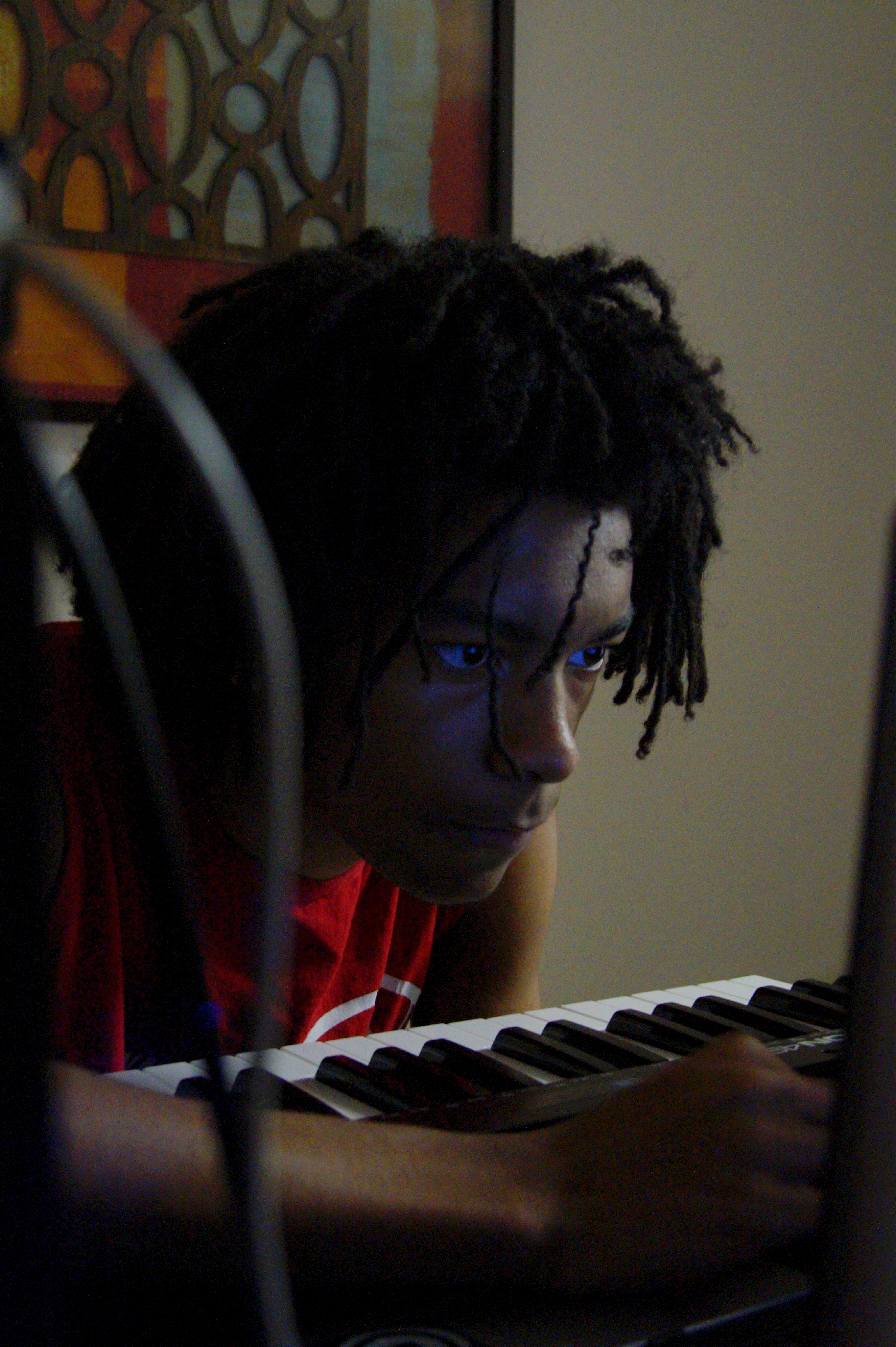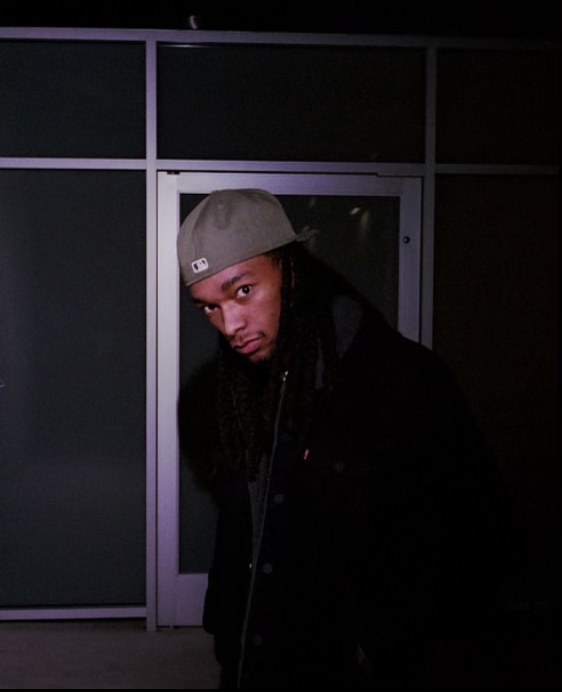Before there was Scott Bridgeway, musical collaborator with hip-hop superstar Kendrick Lamar, there was Ruchaun Akers Jr., wide receiver for the Roanoke Falcons sandlot football team.
Akers was born in Roanoke and started elementary school in the Star City before he and his mother moved to Charlotte, North Carolina, when he was 9 years old. During his middle school years, he dropped sports in favor of music, spending hours in his room constructing his own beats and samples on computer software and drum machines.
That choice paid off big time.

Five years ago, Akers was a Charlotte teenager who liked to play video games and make beats. Today, he lives in Los Angeles, where he works as a music producer under the Scott Bridgeway moniker alongside Lamar, helping to create the rapper’s chart-topping singles “Squabble Up” and “Luther” from Lamar’s new album, “GNX.”
Under the Bridgeway name, Akers co-produced three songs on the album, which is being hailed by music critics as one of the best records of the year.
“It’s crazy,” Akers, who turns 24 on Jan. 9, said of his rapid rise in the world of big-time hip-hop. He has also produced tracks for Kanye West, Baby Keem and other rappers.
“It’s a one-in-a-million-type thing.”
Even though he has been gone from Roanoke for nearly 15 years, he still returns there to visit his father and other relatives. Most recently, he came to Roanoke to spend time with family over Thanksgiving.
He lived part of his earliest years in the small Northwest Roanoke neighborhood of Washington Heights near Westside Elementary School, where he attended his first three grades. His childhood memories of the city mostly center around football games and basketball camps, and spending time at his grandmother’s house. Most summers, he would return to Roanoke to see grandparents and his father.
Even though he didn’t create his own tunes until moving to North Carolina, his musical roots run deep in Roanoke, where early on his mother fostered a love for all types of music, ranging from rap and soul to rock and country. His father favored harder-edged hip-hop, Akers said.
Akers’ music will most likely be heard from one of the largest television stages in the world, when Lamar performs at halftime of Super Bowl LIX on Feb. 9 at the Caesars Superdome in New Orleans.
“He manifested the life and career that he always wanted,” said Akers’ mother, Sherri Davis, a graduate of William Fleming High School. “He’s wanted this since he was 15. It brings tears to my eyes watching it happen.”
From ‘Call of Duty’ to the LA scene
Lamar’s album has received mostly outstanding reviews since it was unexpectedly released on Nov. 22. Lamar (born Kendrick Lamar Duckworth) is one of the biggest stars in hip-hop history, having earned 17 Grammy Awards and the 2018 Pulitzer Prize for Music.
The West Coast rapper, whose hip-hop feud with Toronto-born nemesis Drake has dominated rap news for the past year, recently hit No. 1 on the Billboard Hot 100 with the single “Squabble Up” and scored another top-5 hit with “Luther,” both of which were co-produced by Akers, credited as Scott Bridgeway, along with longtime Lamar collaborators Sounwave, M-Tech and Jack Antonoff.
For “Squabble Up,” Akers said that the rapper gave him a song from 1984 called “When I Hear Music” by Brooklyn-born singer Debbie Deb. Working side by side with Lamar and Sounwave in a Los Angeles recording studio, Akers cut samples from the track to create a soundscape of beats and grooves, over which Lamar would rap his lyrics.
“They gave me Debbie Deb and told me to flip it, chop it up and ‘go crazy on it,’” Akers said.
Using the music production software Serato, Akers took the song apart and pieced together a track in about half an hour, he said.
The software “is more like a video game way to chop up samples, it’s so easy to do,” he said. “The full-length song was a popular skating-rink-type song from back in the day. I found the best five to 10 seconds of that song, and made a beat out of it.”
After the track was complete, Lamar freestyled some lyrical ideas for about 30 minutes, wrote down some words, went into a vocal booth and laid down the raps.
“We made a song in like a day, it’s crazy,” Akers said.

In its review of “GNX,” Variety called “Squabble Up” the catchiest tune on the album. The single “Luther,” which features a guest appearance by the singer SZA, includes a sample of Luther Vandross’ 1982 Marvin Gaye-penned hit “If This World Were Mine,” and was described by Pitchfork as “innocuously sweet and easy to listen to, punched-up by a Luther Vandross sample that melts into the orchestral flourishes.” Akers, alias Bridgeway, also co-produced “Peekaboo.” Both “Squabble Up” and “Luther” hit No. 1 on Billboard’s Hot R&B/Hip-Hop chart.
Akers’ path from Charlotte bedroom to LA recording studios to the top of the charts started in a highly unusual performance arena: His musical talents were discovered while he played the video game “Call of Duty.”
In late 2019, right before the COVID-19 pandemic shut down the country, Akers, then 19, was playing the popular game with an online group. As the action and virtual battles unfolded onscreen, Akers played some of his original music, which the other players could hear through their headsets.
“While I played the game, I made some beats in the background,” Akers said. “We were all on a party chat, kind of like a Zoom call, playing a video game with friends.”
Akers didn’t know all of the other gamers in the group, but one of the players turned out to be a hip-hop producer called Cardo Got Wings, who had worked with Lamar, Travis Scott and Drake. Cardo liked what he heard (“That’s hard!” Akers said Cardo told him) and he sent Akers his number.
Within a couple of months, Cardo and Baby Keem sent Akers some ideas to work on.
“It was like a test run to see if I was any good,” Akers said.
He passed. In July 2020, Akers flew to Los Angeles and started working with Baby Keem on his album “The Melodic Blue.” One of the songs that Akers worked on was “range brothers,” which featured Baby Keem’s cousin — Kendrick Lamar.
From there, Akers scored more production work, including co-producing Kanye West’s “We Did It Kid.” Soon, Lamar and Sounwave were involving him in studio sessions.
“It’s crazy how all this has happened, how my career is connected to a video game,” he said.
Baby Keem was the guy who gave him the Scott Bridgeway alias. Akers wouldn’t say much about the origin of the pseudonym, other than to call it just “a random name.”
“My family knows me as Ruchaun and the music world knows me as Scott Bridgeway, but I’m the same person,” he said.
‘He was listening all along’
To his mother, though, he’s “RJ,” initials for “Ruchaun Junior.”
Akers credits his mom with inspiring much of his musical preferences. She loved the hip-hop stars who arose from Virginia’s Hampton Roads region in the late 1990s and early 2000s — artists that include Missy Elliott, the Neptunes (which featured Pharrell Williams and Chad Hugo) and Timbaland.
“I basically got my musical tastes from my mom,” Akers said. “We’d be in the car and I remember hearing ‘Drop It Like It’s Hot’ [by Snoop Dog]. The Neptunes played a big part of my music influences. I fell in love with them.”
Being a teenager growing up in the 21st century meant that much of his music exposure came through video games. He remembered that EA Sports “NBA Live 2004” included OutKast’s “Ghetto Musick” and the Black Eyed Peas.
“Those songs would be stuck in my head,” he said.
But he also heard hard rock songs while playing “Guitar Hero” and “Mortal Kombat,” he said, games that gave him an appreciation for Rage Against the Machine, as well as his first exposure to Michael Jackson’s “Beat It” and the Pat Benatar 1980s radio staple “Hit Me With Your Best Shot.”
Akers’ expansive musical palette doesn’t surprise Davis, his mother.
“I grew up in the era when MTV played music,” she said. “I heard Meat Loaf, Celine Dion, rap, country. … In our household, you’d hear Kurt Cobain, Sugarland, Biggie [Smalls], Mobb Deep all in the same day.”
She never knew if the influences were sinking in, though. Having dabbled as a DJ herself when she was a teenager, she told him about composers, writers and producers.
“I’d think, ‘He’s not paying attention,’” she said. Then, one day while visiting him in Los Angeles, she saw a biography of the late producer Quincy Jones on his table.
“It turns out he was listening all along,” his mother said.
That vast musical background has served Akers well while working with Lamar, who employs a diverse collection of collaborators that includes Antonoff, the former guitarist for the group Fun, best known for its ubiquitous 2011 radio anthem “We Are Young.”
Akers equates working with Antonoff and others to jamming in a band.
“It’s like the best feeling,” Akers said. “Jack will play keyboards and I will be at my computer doing drums. It’s like an impromptu freestyle jam session. It’s the most fun ever.”
Akers said that his father’s musical preferences leaned more toward 50 Cent and other “hardcore” rap, as he described it. Davis was not married to Akers’ father when she had the baby and she later opted to move to Charlotte, where she married and had another son.
Akers said that when he was in the seventh grade, his stepfather asked him what he wanted to be when he grew up. When Akers replied, “I want to make music,” his stepfather bought him a portable music production console, commonly called an MPC, on which the kid could record and tinker with his own sounds. A few years later, Akers moved on to more advanced FL Studio recording and sampling software.
He created an alias called Sylnse (pronounced “Silence”) and started making beats for his friends.
“When I was 12, I wanted to rap,” he said. “Then I realized I wanted to produce and make music myself. I would record my friends rapping to my beats.”
During those years, his mother and stepfather frequently worried that Akers spent too much time playing video games.
“He was a teenager yelling at the top of his lungs,” Davis said. “I’d unplug the WiFi and he’d go, ‘Mom, nooooooo!’ … It was insane. It got on my nerves, and then it just ballooned.”
Currently, Akers, under his Bridgeway alias, is working on a new Baby Keem album.
“For me, music is therapeutic,” Akers said. “The most important thing for me is to make people feel some sense of emotion. You can cry or be happy, feel inspired. … Music is so refreshing and exciting, and I am always trying to recreate that feeling in my music.”
___________________
Correction 9:15 a.m. Jan. 6: Ruchaun Akers’ mother, Sherri Davis, graduated from William Fleming High School. Her alma mater was incorrect in an earlier version of this story.



